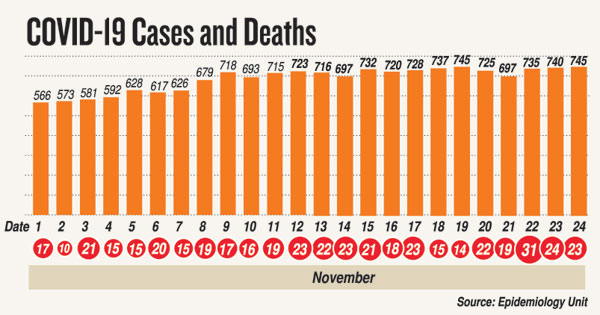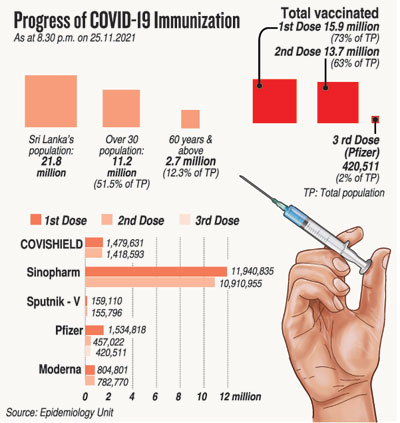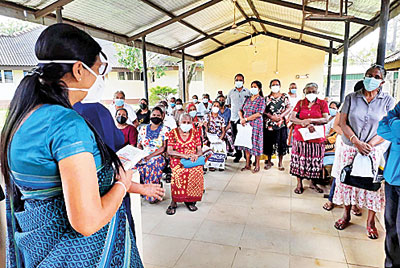News
SL must act now and expedite booster jabs

Sri Lanka should “act right now” to pre-empt the possibly very highly transmissible ‘Omicron’ variant (B.1.1.529) from getting a stranglehold in the country, a scientist strongly urged on Friday.
“We need to act very fast and use the ‘window of opportunity’ to cover as many people as possible with the booster vaccination to prevent the impact that this new variant could cause,” reiterated Prof. Neelika Malavige, Head of the Department of Immunology and Molecular Medicine, University of Sri Jayewardenepura.

Prof. Neelika Malavige
She said that the need of the hour is to “buy time” to rollout the boosters quickly. “We have a window of opportunity. We need to proactively give out the boosters and protect the people by throwing a safety net to buy a little time.”
These warnings came as there were ripples of serious concern over the newly-detected COVID-19 mutant. Around 66 confirmed infections were identified in South Africa, Botswana and Hong Kong and several countries such as the United Kingdom implemented border controls to prevent the variant from sneaking in.
Concerns have heightened after the South African Centre for Epidemic Response and Innovation declared this week that the variant has an unusually high number of mutations, with more than 32 in the key spike protein and is spreading very fast.
It is too early to see the extent to which these mutations could evade natural immunity, escape vaccine efficacy and have enhanced transmissibility, the centre said.
“Current data from South Africa and Botswana seem to be pointing in the direction of the new variant being more transmissible than Delta,” stressed Prof. Malavige, explaining that to aggravate matters it also seems as if there are particular mutations which could possibly help the variant to evade both vaccine and natural-infection induced immunity.
 Comparing and contrasting variants, she said that Alpha, Beta, Gamma and Delta are called ‘Variants of Concern’ because of the devastation they caused. Although there was concern regarding Lambda, Epsilon and Mu, they did not cause so much impact. This new variant, however, is causing much concern because initial data seem to be showing that there is a “real threat” of it being something “very nasty”. She explained that although Delta was more transmissible, there was less immune evasion. Immune evasion from Beta, meanwhile, was significantly more but it was less transmissible than Delta. Dangerously, with this new variant, however, there seems to be a ‘double whammy’ – more transmissibility and immunity evasion.
Comparing and contrasting variants, she said that Alpha, Beta, Gamma and Delta are called ‘Variants of Concern’ because of the devastation they caused. Although there was concern regarding Lambda, Epsilon and Mu, they did not cause so much impact. This new variant, however, is causing much concern because initial data seem to be showing that there is a “real threat” of it being something “very nasty”. She explained that although Delta was more transmissible, there was less immune evasion. Immune evasion from Beta, meanwhile, was significantly more but it was less transmissible than Delta. Dangerously, with this new variant, however, there seems to be a ‘double whammy’ – more transmissibility and immunity evasion.
There is consolation when Prof. Malavige points out that although people can possibly get re-infected due to this new variant evading immunity (both from natural infection and vaccination), they are unlikely to get severe disease if their immunity against COVID-19 is further strengthened by a booster.
Looking at border control measures such as travel bans by countries to prevent the new variant from getting in, she says that such action would obviously delay it, but past experiences have shown that it may not be possible to halt its onslaught. If it is very transmissible, it will come in and stopping its entry will be difficult, as all countries have learnt with other variants.
When asked whether the new variant has come to Sri Lanka, Prof. Malavige said: “Hopefully, no.”
However, she urged that as there is a time-lag between a virus being present in the community and it being detected, it is “extremely” important for everybody to ramp up genetic sequencing so that the country can “catch” or detect its arrival early.
“It is a good thing that unlike other countries in Asia, Sri Lanka is administering the booster to further boost people’s immunity. Data have proven that such boosting of immunity helps to lessen the impact even if a variant comes in,” she added.
| NMRA studying the pills Sri Lanka has not registered any pill to fight COVID-19 but the National Medicines Regulatory Authority (NMRA) is studying the data, it is learnt. He said that no timeline with regard to approval can be given as it would depend on the provision of satisfactory data. ‘PAXLOVID’ developed by Pfizer, another American pharma company, is also meant for COVID-19 patients reportedly to reduce hospitalization and death by 89%. Both these pills have not been approved by America’s Food and Drug Administration (FDA), while the United Kingdom has recommended Molnupiravir but has not begun using it yet.
| |
| Take immediate steps to reduce risks from new variant getting a footholdIt would be prudent for Sri Lanka to take measures to reduce the risk of a new SARS-CoV-2 variant – recently detected in several southern African countries – from gaining a foothold here. Action needs to be taken now, said a Virologist familiar with the data on this variant. Travel associated cases linked to this variant have now been reported from other countries such as Hong Kong. The WHO has just designated this virus a ‘Variant of Concern’. The rapid increase in numbers caused by this novel variant is causing concern and South African Virologist Dr. Tulio Oliveira has told the media that the RT-PCR positive rate in his country has jumped from <1% to 7% in a few weeks. This indicates a virus that is able to spread rapidly. The virus has many mutations that have previously been associated with partial escape from immunity from past infection or vaccination. It also has mutations previously associated with increased transmissibility. Detailed work to address these questions are ongoing through studies in South Africa and in laboratories worldwide, it is understood. ‘Don’t lump all testing categories together’ With worries of COVID-19 infection numbers on the rise, many health experts were concerned whether Sri Lanka is performing adequate testing to pick up those with this infection. “In pandemic times, we should be conducting four types of testing – random sampling from the community; testing of patients who come to hospitals with influenza-like symptoms; testing of people who have got exposed to the virus; and testing of people who have developed symptoms and are worried they may be having COVID-19,” said a doctor. The issue is whether we are testing these categories and why we are not having these specific categories separately, without lumping everything together, he said. He pointed out that when all figures are put together, the danger is that there is no way of knowing the trends, whether infections are going up or down. “We will not know the real situation. We are trying to forecast what will happen but the trend is not known on a scientific basis,” he added. NIID turns blue to battle super-bugs It was the first to face the pandemic and rise to the occasion. The pandemic has underscored the importance of infection control, rational use of antibiotics and the dangers of antimicrobial resistance (AMR). With World Antibiotic Awareness Week 2021 coming round, all staff of the National Institute for Infectious Diseases (NIID) including the Director put their shoulder to the wheel to ‘Go Blue for the AMR Campaign’.  An awareness programme for patients in progress With bunches of blue balloons festooning the ‘artery’ of the network of corridors and the main areas including the outpatients’ department (OPD) and the medical and dental clinics of the sprawling NIID, this campaign was spearheaded by Consultant Microbiologist Dr. Malika Karunaratne and the Infection Control Team. Attired in blue, hospital staff sported badges symbolising the campaign to get the attention of patients on the importance of curbing AMR. Awareness programmes through short talks were held for patients. The take home messages were: Do not buy antibiotics over-the-counter without a doctor’s prescription. Do not take antibiotics for fever, cough, sneezing, loose stools etc., without seeking a doctor’s advice. Do not share prescriptions. Antibiotics should be taken according to a personalized prescription. The full, prescribed course of antibiotics should be completed. There should be no half-doses. Do not give antibiotics to pets, if they are ill. Always drink boiled cooled water, wash raw salads well before consumption, cook food well and practise good hand hygiene before eating to prevent getting drug-resistant pathogens from animals. Protect the important residual microbiota (good bacteria) by not self-medicating with antibiotics. Meanwhile, two lectures on AMR were held for the staff to spotlight the magnitude of the problem, pointing out that by 2050, the ‘main killer’ would be infections brought on by multi-drug resistant organisms, said Dr. Karunaratne. She said that discussions were held on how to avoid unnecessary OPD antibiotic prescriptions, while NIID data on the alarming prevalence rates of multi-drug resistant bacteria over the last six months were presented to the clinical staff followed by a discussion on preventive measures. Special emphasis had been on hand hygiene, medical equipment sterilization, cleaning of the environment, hospital linen management, infectious waste management and decolonization of Methicillin-resistant Staphylococcus aureus (MRSA). |
The best way to say that you found the home of your dreams is by finding it on Hitad.lk. We have listings for apartments for sale or rent in Sri Lanka, no matter what locale you're looking for! Whether you live in Colombo, Galle, Kandy, Matara, Jaffna and more - we've got them all!

